
Vitamin C is also known as L-ascorbic acid and ascorbate (the anion of ascorbic acid), which is an essential nutrient for human beings and other animal species. The opposite D-enantiomer called D-ascorbate has equal antioxidant power with L-ascorbic acid, but does not exist naturally and has no physiological function.
Scientists at Creative Proteomics utilize a highly quantitative method with high-performance liquid chromatography (HPLC) for the determination of Vitamin C levels in various samples, including Tissue and more. High-Performance Liquid Chromatography (HPLC) with UV detection is used for the determination of Vitamin C (254 nm) levels in a lot of biological samples. This Methodology provides accurate, reliable, and reproducible results of Vitamin C measurement, which enables us to analyze of Vitamin C levels in vitro and in vivo.
In humans, Vitamin C is essential to a healthy diet as well as being a highly effective antioxidant, acting to lessen oxidative stress; a substrate for ascorbate peroxidase in plants (APX is plant specific enzyme), and an enzyme cofactor in at least eight enzymatic reactions, including several collagen synthesis reactions that, when dysfunctional, resulting the most severe symptoms of scurvy. In animals, these reactions are especially important in wound-healing and in preventing bleeding from capillaries. Ascorbate may also act as an antioxidant, protecting against oxidative stress. Vitamin C is reported in high concentrations in immune cells, and is consumed quickly during infections. The mechanism of how Vitamin C interacts with the immune system is not clear, and it has been hypothesized to regulate the activities of phagocytes, the production of cytokines and lymphocytes, and the number of cell adhesion molecules in monocytes.
The Russian-Polish botanist M. Tswett is generally recognized as the first person to establish the principles of chromatography. In a paper he presented in 1906, Tswett described how he filled a glass tube with chalk powder (CaCO3) and, by allowing an ether solution of chlorophyll to flow through the chalk, separated the chlorophyll into layers of different colors. He called this technique “chromatography”. Fundamentally, chromatography is a technique used to separate the components contained in a sample. High Performance Liquid Chromatography (HPLC) is a method able to separate non-volatile, thermally unstable, and polar components separate or in a mixture. HPLC is a type of chromatography that, because of its wide application range and quantitative accuracy, is regarded as an indispensable analytical technique, particularly in the field of organic chemistry. It is also widely used as a preparation technique for the isolation and purification of target components contained in mixtures.
Vitamin C Analysis Service at Creative Proteomics supports your research in Vitamin C Analysis. HPLC Based Analysis Service Platform enable us at Creative Proteomics offers you a state-of-the-art Analysis Service.
Sample Type
Tissue and more
Method
High-Performance Liquid Chromatography (HPLC) with UV detection is used for the determination of Vitamin C (254 nm) levels in a lot of biological samples. This Methodology provides accurate, reliable, and reproducible results of Vitamin C measurement, which enables us to analyze of Vitamin C levels in vitro and in vivo.
Send us your samples, you will get all information that you need!